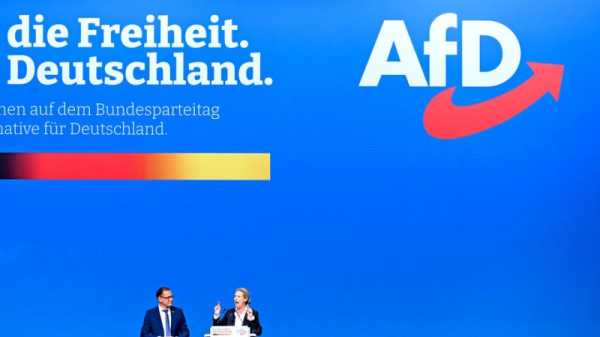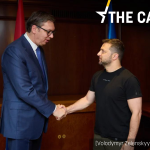
Germany’s rising far-right AfD party may use local politics to amplify its message and draw attention, experts say, as the party gains ground in communities throughout Eastern Germany.
In June and July, the victories of two AfD politicians in local elections in the east sent shockwaves through the country, as it marked the first time that AfD candidates managed to attain executive-level positions. Both are due to be sworn in on Wednesday (23 August).
While their effective power will be limited, there are concerns that the party is exploiting the attention linked to the offices.
“Responsibility in local politics offers an opportunity for the party to emphasise certain positions, so it’s possible that AfD office holders will use the attention to flag their ideas efficiently in public, supported by the party leadership,” Norbert Kersting, a political scientist from the University of Münster, told EURACTIV.
The AfD is currently polling at a record high and has overtaken the ruling SPD as the second-most popular party.
It is particularly strong in Eastern Germany: The most recent polls for the 2024 regional elections in Thuringia and Saxony, two states in the east, see the party in the lead. Far-right victories here, as well as at next year’s European elections, are no longer unthinkable.
By comparison, the AfD’s victories in the mayoral election in the municipality of Raguhn-Jessnitz, Saxony-Anhalt, and in Sonneberg, Thuringia, come with little actual power.
“There is no danger of certain policies simply being pushed through as district chief executives and mayors have to work closely with local councils and organise majorities,” Kersting said.
History repeating itself?
However, local politics can be a tool to mobilise support as it provides visibility, Kersting said. He pointed to topics such as migration, where municipalities play an important role as they are responsible for organising accommodation for and integration of refugees.
Historical parallels abound: Thuringia was the first state where the NSDAP, the party of Adolf Hitler, managed to join a government in 1930 as a junior partner in a regional coalition, which was soon followed by the national takeover in 1933.
“Thuringia was one of the early strongholds of the NSDAP (…) and experienced something of a test run for leading National Socialists in the 1930s,” Steffen Raßloff, a regional historian and associate researcher of the Society for Research on Democratic History, a think tank, told EURACTIV.
Now again, the far-right’s message works particularly well in rural areas of Eastern Germany, in part due to a lack of familiarity with migration after a long period of isolation in a Communist dictatorship as well as disappointed expectations following Germany’s reunification, Raßloff argued.
Accordingly, the AfD’s victories have sent shockwaves through the political sphere and civil society.
Omid Nouripour, co-leader of the Greens, spoke of a “black day for democracy” after the Sonneberg election, while the Central Council of Jews in Germany called on “all democratic political forces” to act against the “dam breach”.
Still, Raßloff remained cautious about pushing historical parallels too far, pointing to major differences in political culture.
Ruffled feathers
Meanwhile, the AfD’s leadership has embraced the symbolic value of its success.
“This is just the beginning,” AfD co-leader Tino Chrupalla posted on the social media platform X, formerly known as Twitter, after the run-off in Sonneberg. The newly elected district executive, Robert Sesselmann, has already been deployed on the campaign trail ahead of regional elections in Hesse in October.
The AfD’s wins have ruffled some feathers at the national level. In a recent interview, Friedrich Merz, leader of the centre-right CDU, the largest opposition party, made an ambiguous statement about local collaboration with the AfD.
“Ways will have to be found for how regions, cities, and districts can be shaped together”, he suggested, hinting at a potential collaboration with the AfD at the local level. The ensuing backlash hurt Merz’s popularity, as collaboration with the far-right remains a taboo in Germany.
Both Kersting and Raßloff warned that this stance should be upheld as a strategy to deal with the far-right.
“[Collaboration] would probably not be the right way,” Kersting said with regard to the CDU, warning that this would probably cost the party votes and only boost the AfD.
“Democracy in the Weimar Republic was undermined because the mainstream parties allowed it to be hijacked by collaborating with the NSDAP. It’s important for civic parties to remain cautious about who they collaborate with“, said Raßloff.
[Edited by Oliver Noyan/Benjamin Fox/Zoran Radosavljevic]
Read more with EURACTIV

MEP: Serbia’s Vucic pressed Zelenskyy on Kosovo non-recognitionIn today’s edition of the Capitals, find out more about the ongoing government spa in German, Romania risking to not meet its 2025 recycling target , and so much more.
Source: euractiv.com



